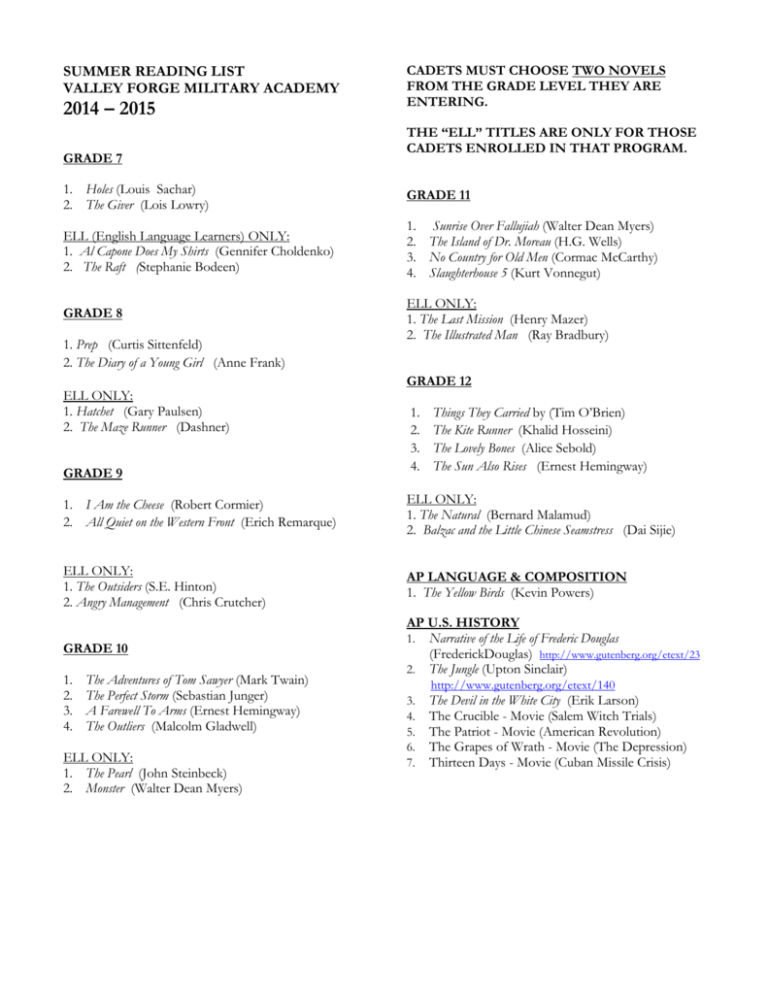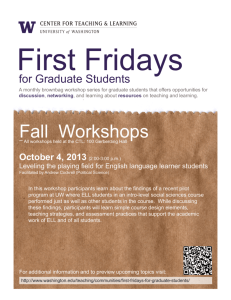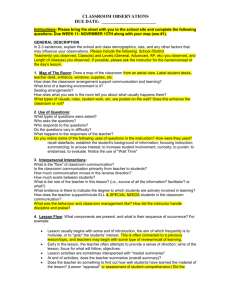SUMMER READING LIST VALLEY FORGE MILITARY ACADEMY
advertisement

SUMMER READING LIST VALLEY FORGE MILITARY ACADEMY 2014 – 2015 GRADE 7 CADETS MUST CHOOSE TWO NOVELS FROM THE GRADE LEVEL THEY ARE ENTERING. THE “ELL” TITLES ARE ONLY FOR THOSE CADETS ENROLLED IN THAT PROGRAM. 1. Holes (Louis Sachar) 2. The Giver (Lois Lowry) GRADE 11 ELL (English Language Learners) ONLY: 1. Al Capone Does My Shirts (Gennifer Choldenko) 2. The Raft (Stephanie Bodeen) 1. Sunrise Over Fallujiah (Walter Dean Myers) 2. The Island of Dr. Moreau (H.G. Wells) 3. No Country for Old Men (Cormac McCarthy) 4. Slaughterhouse 5 (Kurt Vonnegut) GRADE 8 ELL ONLY: 1. The Last Mission (Henry Mazer) 2. The Illustrated Man (Ray Bradbury) 1. Prep (Curtis Sittenfeld) 2. The Diary of a Young Girl (Anne Frank) ELL ONLY: 1. Hatchet (Gary Paulsen) 2. The Maze Runner (Dashner) GRADE 9 GRADE 12 1. 2. 3. 4. Things They Carried by (Tim O’Brien) The Kite Runner (Khalid Hosseini) The Lovely Bones (Alice Sebold) The Sun Also Rises (Ernest Hemingway) 1. I Am the Cheese (Robert Cormier) 2. All Quiet on the Western Front (Erich Remarque) ELL ONLY: 1. The Natural (Bernard Malamud) 2. Balzac and the Little Chinese Seamstress (Dai Sijie) ELL ONLY: 1. The Outsiders (S.E. Hinton) 2. Angry Management (Chris Crutcher) AP LANGUAGE & COMPOSITION 1. The Yellow Birds (Kevin Powers) GRADE 10 AP U.S. HISTORY 1. Narrative of the Life of Frederic Douglas (FrederickDouglas) http://www.gutenberg.org/etext/23 2. The Jungle (Upton Sinclair) 1. 2. 3. 4. The Adventures of Tom Sawyer (Mark Twain) The Perfect Storm (Sebastian Junger) A Farewell To Arms (Ernest Hemingway) The Outliers (Malcolm Gladwell) ELL ONLY: 1. The Pearl (John Steinbeck) 2. Monster (Walter Dean Myers) http://www.gutenberg.org/etext/140 3. 4. 5. 6. 7. The Devil in the White City (Erik Larson) The Crucible - Movie (Salem Witch Trials) The Patriot - Movie (American Revolution) The Grapes of Wrath - Movie (The Depression) Thirteen Days - Movie (Cuban Missile Crisis) VALLEY FORGE MILITARY ACADEMY SUMMER READING PROGRAM 2014-2015 CHOOSE TWO BOOKS: While reading the novels, cadets must EITHER write marginal notes in the novel OR write notes on 3X5 or 5X8 index cards (more on that in a minute): WHEN READING: As you journey into the worlds presented within each of these intriguing novels, you must realize that you are to read these works as scholars. In order learn how to read for deeper meaning, you must be an active reader and engage your mind and your pen. You need to engage with the text. So, how does one do this? • First, whenever you sit down to read you need to have a writing utensil in hand so that you can create marginal notes or index cards that will be useful for engaging with the text- see the back of this sheet on how to take notes. Buy your books if you can and write your notes on the page or borrow your books and take notes on index cards. • Next, many (not all) of these novels explore how an individual develops from a child to an adult and attempts to negotiate his or her place in the world in which he or she lives. This type of novel is often referred to as a “coming of age” novel, or “bildungsroman.” This is defined by www.virtualsalt.com as: A type of novel where the protagonist is initiated into adulthood through knowledge, experience, or both, often by a process of disillusionment. Understanding comes after the dropping of preconceptions, a destruction of a false sense of security, or in some way the loss of innocence. Some of the shifts that take place are these: ignorance to knowledge, innocence to experience, false view of world to correct view, idealism to realism and immature responses to mature responses. Note this as you read. Think about how the author communicates the coming-of-age experience and its elements. • DO NOT RELY ON Cliff’s Notes, Sparknotes, etc.- these are strictly forbidden for the summer reading program. MARGINAL NOTES OR INDEX CARD NOTES Notes demonstrate that your brain is actively engaged in a dialogue with the text. This is the key to reading for deeper meaning and enhances reading comprehension. REMEMBER: • Do not lengthen your reading time unnecessarily by writing lengthy comments • Use abbreviations (just make a key in the front of the text), one word references, notations and symbols • The comments should be enough to remind you of your thoughts at a glance and should help you locate key passages easily. • AVOID underlining or highlighting without commenting- if you think it is important enough to underline, there must be a reason- even if it is in the form of a question. • Use the end of chapters to write short responses to what is happening in the novel. • Make the most notes in the first chapter of each novel- ask yourself “Why does the author choose to begin the novel in this way?” There is some reason. GOALS: • Active reading - to keep yourself focused while you read. This promotes reading comprehension. • To remember your first reactions- these will be key to writing about the reader’s experience later • To be able to find key passages quickly • To begin to analyze literature – to enhance your reading experience. (Our goal is always a very close reading of text) • To learn how to read for deeper meaning.



